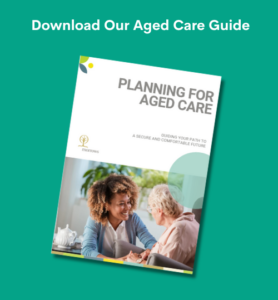Confused about aged care fees and what they mean? You’re not alone. If you or a loved one needs to consider a move into residential aged care, understanding the associated fees and getting a clear picture of costs is challenging. You’ll encounter a maze of acronyms like RADs, DAPs, MPIRs, MTAs, and MTFs along the way. Where do you start, and how do you navigate this landscape? And what might change following the recent release of the Aged Care Taskforce report on aged care funding?
Our advisers have prepared this article to break down the basics and help you understand the essential terms.
Why So Many Fees?
A move into residential care is essentially a move into a new home—a home with built-in care and support. Like living in your own home, residential care fees can be divided into three categories:
- Accommodation costs
- Daily living expenses
- Care services
The way these fees are calculated differs from typical home expenses. The government sets some fee structures and rules, while others may be established by the care provider.
Paying for Accommodation
Paying for a room is one of the more complex parts of aged care. Costs can range widely, with prices going as high as $2.5 million, though the average lies between $400,000 and $700,000. Though this isn’t property ownership, you generally have two options for covering accommodation:
- RAD (Refundable Accommodation Deposit): This one-time, lump-sum payment secures your accommodation. Once you leave the facility, the RAD is fully refundable to you or your estate, less any agreed-upon deductions.
- DAP (Daily Accommodation Payment): If a lump sum is unfeasible or undesired, the DAP allows you to pay “rent” daily. This payment is calculated based on the MPIR (Maximum Permissible Interest Rate), a government-set interest rate that determines the daily rate if you choose not to pay the RAD in full.
Accommodation costs are typically self-funded, so making affordable choices is essential. However, if your financial capacity is assessed as low, the government may adjust the pricing structure and potentially help cover some or all these costs.
Potential reforms could eventually phase out the RAD, requiring all residents to pay daily accommodation fees instead. Until then, discussions are underway regarding whether new RADs might be partially non-refundable.
Paying for Daily Living Expenses
Once someone moves into aged care, many daily bills—like food, electricity, gas, and cleaning—will no longer be handled individually. Instead, these essentials are covered by the care provider, and they’ll be asked to pay a Basic Daily Fee to share in these costs.
Currently, the government sets a flat rate for the Basic Daily Fee across all residential care services, but this may change. Proposed reforms might allow care providers to set individual rates based on the quality and level of services, which could impact daily fees.
Paying for Care Services
On average, the government currently subsidises around 75% of aged care services, with the remaining 25% covered by the resident. The contribution is determined through a Means-Tested Fee (MTF), which is based on the individuals MTA (Means Tested Amount), which is an assessment of income and assets.
The decisions made about structuring assets and income can impact how much will need to be paid toward these care services. To help with planning, there are annual and lifetime caps on the MTF, limiting the total amount that will need to be paid.
It is generally agreed that these costs are high and need to be subsidised by the government, but there is not a clear direction yet on where reform will go in this area. Some proposals consider abolishing means-testing with the government paying the full cost. Other proposals consider increasing means-testing so that wealthier residents pay more of the cost. We need to wait to see what the Government decides to do.
Need Help Making Aged Care Decisions?
Making aged care decisions whether it be for yourself, or a loved one can be overwhelming. Beyond the fees and acronyms, aged care choices touch on everything from family preferences to tax, pension entitlements, estate planning, and long-term financial impacts.
We have a team of Morrows financial advisers who specialise in aged care. They have the knowledge and tools to guide you through this process, review your options, and help you and your loved ones make informed decisions.
IMPORTANT INFORMATION: The information is general only and has been prepared without consideration of your individual objectives, financial situation or needs. Before making any decisions, you should consider the appropriateness of your personal investment objectives, financial situation or individual needs. We recommend you speak to your financial adviser, registered tax agent or legal adviser before making any decisions based on this information.

Emma Stoffels

Download Our FREE Aged Care Guide!
To understand more about the aged care process, the fees and key considerations, complete the form below to access our Aged Care Planning Guide.
If you need further assistance, please reach out, our Morrows Advisors are more than happy to help you and your loved ones.



